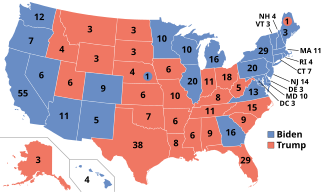United States Electoral College






United States Electoral College
The United States Electoral College is a body established by the United States Constitution that elects the President of the United States and the Vice President of the United States every four years. The Electoral College system was devised by the Founding Fathers as a compromise between election of the President by a vote in Congress and election of the President by a popular vote of qualified citizens.
Composition and Function[edit]
The Electoral College consists of 538 electors. A majority of 270 electoral votes is required to elect the President. Each state's entitled allotment of electors equals the number of members in its Congressional delegation: one for each member in the House of Representatives plus two for its Senators. The District of Columbia is allocated three electors and treated like a state for purposes of the Electoral College under the terms of the Twenty-third Amendment.
Electors are selected by the states in a manner each state legislature determines. Typically, political parties nominate electors at their state conventions or by a vote of the party's central committee in each state. Electors are often, but not always, elected officials or party leaders.
On the first Monday after the second Wednesday in December, the electors meet in their respective states to cast their votes for President and Vice President. These votes are then sealed and sent to the President of the Senate, who on January 6, opens and reads them before both houses of the Congress.
Criticism and Support[edit]
The Electoral College has been the subject of criticism and support over the years. Critics argue that the system can result in the election of a candidate who does not win the popular vote, as happened in the elections of 1824, 1876, 1888, 2000, and 2016. Supporters argue that it protects the interests of smaller states and is a foundational element of American federalism.
Reform Proposals[edit]
Various reform proposals have been suggested, including the direct election of the President by popular vote or the National Popular Vote Interstate Compact, which seeks to ensure the candidate who wins the most popular votes is elected President, without abolishing the Electoral College.
Conclusion[edit]
The United States Electoral College is a unique system for electing the President and Vice President, reflecting the federal structure of the country and the desire of the Founding Fathers to balance the interests of high-population and low-population states. It remains a subject of debate and discussion in American politics.
Ad. Transform your life with W8MD's Budget GLP-1 injections from $75


W8MD offers a medical weight loss program to lose weight in Philadelphia. Our physician-supervised medical weight loss provides:
- Weight loss injections in NYC (generic and brand names):
- Zepbound / Mounjaro, Wegovy / Ozempic, Saxenda
- Most insurances accepted or discounted self-pay rates. We will obtain insurance prior authorizations if needed.
- Generic GLP1 weight loss injections from $75 for the starting dose.
- Also offer prescription weight loss medications including Phentermine, Qsymia, Diethylpropion, Contrave etc.
NYC weight loss doctor appointmentsNYC weight loss doctor appointments
Start your NYC weight loss journey today at our NYC medical weight loss and Philadelphia medical weight loss clinics.
- Call 718-946-5500 to lose weight in NYC or for medical weight loss in Philadelphia 215-676-2334.
- Tags:NYC medical weight loss, Philadelphia lose weight Zepbound NYC, Budget GLP1 weight loss injections, Wegovy Philadelphia, Wegovy NYC, Philadelphia medical weight loss, Brookly weight loss and Wegovy NYC
|
WikiMD's Wellness Encyclopedia |
| Let Food Be Thy Medicine Medicine Thy Food - Hippocrates |
Medical Disclaimer: WikiMD is not a substitute for professional medical advice. The information on WikiMD is provided as an information resource only, may be incorrect, outdated or misleading, and is not to be used or relied on for any diagnostic or treatment purposes. Please consult your health care provider before making any healthcare decisions or for guidance about a specific medical condition. WikiMD expressly disclaims responsibility, and shall have no liability, for any damages, loss, injury, or liability whatsoever suffered as a result of your reliance on the information contained in this site. By visiting this site you agree to the foregoing terms and conditions, which may from time to time be changed or supplemented by WikiMD. If you do not agree to the foregoing terms and conditions, you should not enter or use this site. See full disclaimer.
Credits:Most images are courtesy of Wikimedia commons, and templates, categories Wikipedia, licensed under CC BY SA or similar.
Translate this page: - East Asian
中文,
日本,
한국어,
South Asian
हिन्दी,
தமிழ்,
తెలుగు,
Urdu,
ಕನ್ನಡ,
Southeast Asian
Indonesian,
Vietnamese,
Thai,
မြန်မာဘာသာ,
বাংলা
European
español,
Deutsch,
français,
Greek,
português do Brasil,
polski,
română,
русский,
Nederlands,
norsk,
svenska,
suomi,
Italian
Middle Eastern & African
عربى,
Turkish,
Persian,
Hebrew,
Afrikaans,
isiZulu,
Kiswahili,
Other
Bulgarian,
Hungarian,
Czech,
Swedish,
മലയാളം,
मराठी,
ਪੰਜਾਬੀ,
ગુજરાતી,
Portuguese,
Ukrainian